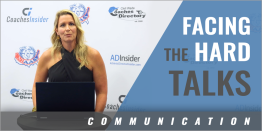|
By: Jason Parker, J.D., CMAA - Muskogee Public Schools (OK) “Know thyself and to thine own self be true.” - Shakespeare To be our best as leaders it is important that we know ourselves. Knowing yourself refers to putting time towards analyzing your background and identifying the meaning behind our T.E.S.T.S (Talents, Experiences, Skills, Traits, Resources). Examining our T.E.S.T.S, no pun intended, can offer valuable insight into our past which will unlock doors in our future and ultimately enable us to optimize our leadership. One thing I encourage all leaders to do during this time of shelter-in place initiatives with more idle-time available, that is, if you have not become homeschool teacher & principal, is to begin to know your story. Knowing your story, and eventually owning it, will not only guide you in knowing yourself but also develop some critical skills that will aid you as a leader and high achiever. Why Own Your Story? Owning your story will make you keenly aware of what sets you apart. Knowing what sets you apart is key for overcoming any challenges you may face. Much like a superhero knowing what superpowers to employ to defeat a foe. Also, owning your story will tell you where to focus your energy. High performers are focused and guided by their strengths. Usually because they have analyzed their T.E.S.T.S and have identified where their talents are best used. Could you imagine Steph Curry as a restauranteur or Tom Brady as a fireman? Great professions but not the best use of their unique giftings. Thirdly, owning your story will make you adept at selling yourself. This is vital to establishing meaningful connections which will open doors for you. Whether you are interviewing, seeking promotion, or getting others to believe in your idea, strong bonds will help your cause. Sharing your story will let others know more about you in a way that is easily packaged for them to remember you. How to Guide To own your story set aside uninterrupted time to focus on your past. This will seem strange at first, but like a therapy session, with practice, you will eventually begin to open up. The following are some guiding steps to help you find what matters. Step 1: Be Inquisitive
Step 2: Make it Narrative
Step 3: Own It
|







